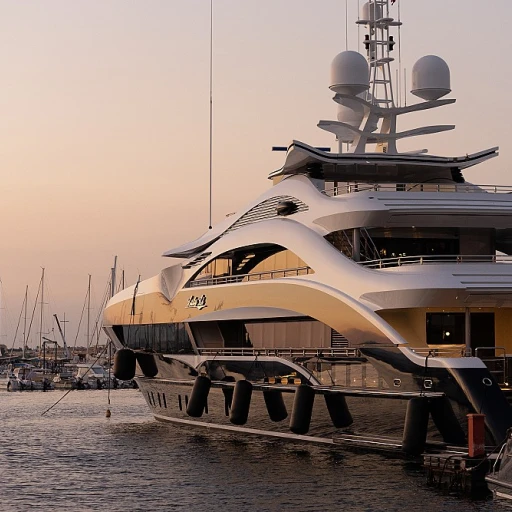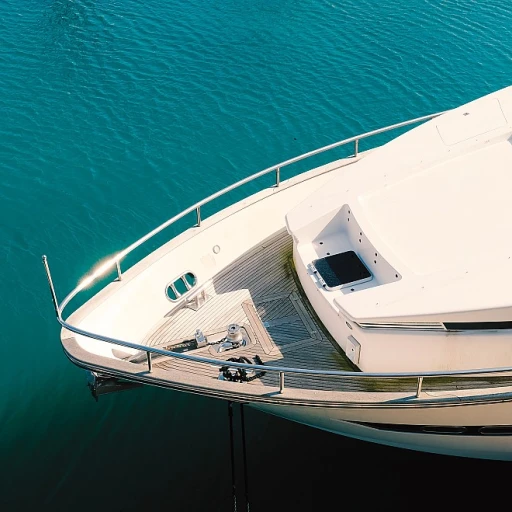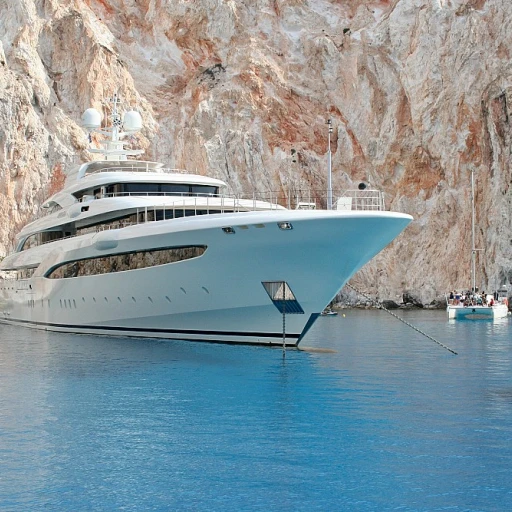
Understanding Yacht Fuel Types
Diverse Fuel Choices for Yachts
Navigating the open seas requires understanding the different yacht fuel types available. When discussing yacht travel, most owners focus on marine diesel and its advantages. Diesel engines are renowned for their fuel efficiency and longevity. However, they come with varying fuel prices and fuel costs, influences predominantly dictated by your yacht's size and engine type. Considering marine fuel, it is crucial for yacht owners to know that fuel consumption and costs can vary significantly based on cruising speed and vessel size. For instance, larger yachts tend to have higher fuel burn rates and need a bigger fuel capacity, impacting both consumption and price. The landscape of yacht fuel isn't limited to marine diesel alone. Alternative options, such as biofuels and hybrid systems, are gaining traction. These newer choices promise lower environmental impact and potential fuel discounts through government incentives or reduced tax costs. Grasping these fuel variations allows yacht enthusiasts to make more informed decisions regarding optimal fuel system configurations and potential cost-saving measures. Assessing the trade-off between cost and efficiency is essential when choosing the best fuel type for your cruising needs. For more insights into yacht fuel, it's pivotal to understand how different vessels adapt their engines. Interestingly, sailboats using motors also offer insights into various propulsion methods and their fuel efficiency, further influencing choices in the broader maritime world.Fuel Efficiency in Yachting
Maximizing Mileage: The Key to Fuel Efficiency in Yachting
The intricacies of yacht fuel consumption require a keen understanding of several factors to ensure maximum fuel efficiency. As yacht owners, it's essential to appreciate the diverse elements contributing to the overall fuel usage and how improvements can be cost-effective in the long run. Firstly, the type of fuel plays a significant role. Diesel engines, widely favored in the industry, offer benefits in terms of fuel consumption, ultimately impacting both cruising speed and distance covered per gallon. Fuel capacity and the efficiency of a vessel's marine diesel engine influence how many nautical miles one can traverse on a single tank. When it comes to yacht size and design, larger vessels typically consume more fuel, but innovations in hull design and materials can improve efficiency. A streamlined hull reduces drag while advancements in engine technology enhance fuel system performance, minimizing fuel burn during yacht travel. One can't overlook the importance of managing fuel costs through strategic cruising. Maintaining an optimal cruising speed is crucial as a slight increase can dramatically hike fuel consumption. For yacht enthusiasts aiming to venture further while keeping fuel costs under control, investing in advanced navigation systems to plot the most efficient course can yield significant savings. Cost-saving measures also extend to understanding the seasonal fluctuations in fuel prices. Planning significant trips when prices are lower could lead to substantial savings. Additionally, some regions may offer tax discounts on marine fuel, aiding in reducing the overall expense. For those interested in further improving fuel efficiency, exploring developments in hybrid and electric engines might hold the key to sustainable yacht travel. As technology evolves, these options become more accessible, promising a combination of environmentally friendly travel and reduced fuel costs. Enhancing your knowledge about yacht engines and their efficiency not only benefits your wallet but also extends the life of your vessel. More insights into this can be found here.Environmental Impact of Yacht Fuel
Environmental Considerations and Consequences
The environmental impact of yacht fuel is a growing concern among yacht owners and the broader marine community. The diesel engines that power many yachts play a significant role in greenhouse gas emissions, which contribute to global warming and marine pollution. The fuel consumption of these engines, often measured in gallons per hour, directly relates to the quantity of emissions released during a voyage. When assessing the environmental footprint of yacht travel, fuel efficiency emerges as a critical factor. Efficient fuel usage not only reduces costs but also minimizes carbon emissions. Yachts that maintain an optimal cruising speed tend to have lower fuel burn, which improves overall fuel efficiency and lessens environmental harm. Marine diesel, a common choice for yacht fuel, presents particular ecological challenges. The production and burning of marine diesel generate pollutants that can adversely affect marine ecosystems. High levels of nitrogen oxides and sulfur oxides, by-products of diesel fuel consumption, contribute to ocean acidification and harm marine life. While newer model engines may offer improved efficiency and reduced emissions, the existing fleet of vessels still represents a significant ecological burden. Yacht size also influences environmental impact, with larger vessels typically consuming more fuel, contributing to greater pollution. Furthermore, the fuel system design can also impact environmental outcomes. Older systems may be less efficient, leading to higher fuel consumption and carbon emissions. Yacht owners can mitigate these effects by investing in modern, fuel-efficient technologies and ensuring regular engine maintenance to optimize performance and sustainability. Addressing the environmental implications of yacht fuel requires a committed effort to adopt greener technologies and practices. To lead the way toward a more sustainable marine future, yacht enthusiasts must be conscious of their fuel choices, consumption habits, and the broader ecological impact of their vessels. For insights into optimizing vessel maintenance to reduce environmental impact, consider exploring this informative guide.Regulations and Compliance
Adhering to Global Standards for Yacht Fuel
Navigating the complex landscape of regulations and compliance is a crucial aspect of yacht fuel management. Understanding the necessity for fuel systems to meet certain criteria allows yacht owners to sail responsibly, without incurring unnecessary legal trouble or financial penalties. From a global perspective, regulations on fuel consumption and emissions have been put in place to ensure that the maritime industry contributes to a more sustainable environment. This involves adhering to standards set by authorities such as the International Maritime Organization (IMO), which imposes strict limits on marine engine emissions, especially for luxury yachts and other large vessels. To comply with these regulations, many yachts have transitioned from traditional diesel to cleaner marine diesel alternatives. This shift not only results in lower fuel consumption, thereby reducing overall fuel costs, but also aligns with the pursuit of greater fuel efficiency. Importantly, the implementation of taxation policies on diesel and non-compliant marine fuel has made it imperative for yacht owners to be aware of tax implications in varying jurisdictions. With fuel prices consistently fluctuating, making informed decisions regarding fuel usage per nautical mile or fuel consumption per gallons per hour can significantly impact the overall cost of yacht travel. Moreover, advancements in fuel technology, such as more efficient engines and improved fuel capacity, assist in staying compliant with these evolving regulations. Staying informed about these innovations is vital for maintaining the balance between performance, speed, and environmental responsibility. Ensuring compliance can also lead to discounts on port charges and other expenses, further influencing the cost-benefit analysis of cruising at optimal speeds. Therefore, knowledgeable management of regulatory requirements not only benefits the environment but also optimizes the economic aspects of yachting.Innovations in Yacht Fuel Technology
Advancements Shaping the Future of Marine Diesel
The yacht industry has not remained static when it comes to fuel technology. One of the pioneering developments in recent years is the shift towards more efficient engines. Yacht builders are continually looking for ways to enhance fuel consumption, which directly contributes to lower fuel costs and overall operational efficiency. With marine diesel playing a pivotal role, innovations in engine design focus on reducing fuel burn even at higher cruising speeds.Hybrid Power Systems Enhancing Fuel Usage
Incorporating hybrid power systems in new yachts is becoming increasingly popular amongst yacht owners looking to minimize fuel costs. These systems cleverly combine traditional diesel engines with electric power, optimizing yacht travel by alternating between the two sources. This technology not only reduces the consumption of gallons per hour but also offers a significant reduction in fuel prices over long nautical miles.Alternative Fuels and Sustainable Advancements
With environmental concerns playing a big part in operational considerations, there's a growing trend towards using alternative fuels. Innovations in biofuels and synthetic fuels aim to lessen the environmental footprint while also potentially offering tax incentives or discounts. This shift reflects a comprehensive approach to reducing marine fuel consumption and embracing sustainable solutions.AI-Driven Fuel Systems
Another innovation taking the yacht industry by storm is the application of AI-driven fuel systems. These advanced solutions use data analytics to predict fuel usage patterns, calibrate yacht engines for optimum performance, and adjust cruising speeds accordingly. As a result, they help maintain fuel efficiency, saving both cost and extending fuel capacity during long voyages.Durable and Efficient Fuel Infrastructure
Finally, upgrading the fuel system infrastructure plays a critical role in managing the cost and price stability of fuel consumption. Enhanced storage solutions and distribution systems are developed to ensure that yachts have the required marine fuel accessibility without the added burden of price volatility. Cost-effective, durable solutions help maintain efficiency and reliability, ultimately contributing to a balanced yacht fuel framework.Future Trends in Yacht Fuel
Harnessing the Power of Tomorrow's Marine Fuel
The marine industry, particularly the yacht sector, continues to make strides towards a more sustainable and efficient future in fuel consumption. As technology advances, yacht engines are being designed to not only enhance fuel efficiency but also reduce the environmental impact. Innovations in fuel types and fuel systems are helping yacht owners navigate the waters with reduced fuel costs and better fuel usage management.
The development of hybrid and electric propulsion systems has seen significant progress. These systems provide an alternative to traditional diesel engines, leading to remarkable reductions in fuel burn and cost. In particular, hybrid systems that combine electric motors with diesel engines allow yachts to run on electricity while cruising at lower speeds, conserving energy and decreasing fuel consumption per nautical mile.
Moreover, alternative fuels such as biofuels and synthetic fuels are gaining traction. These options are produced from renewable sources, and while their current price range can be higher than traditional marine diesel, the long-term benefits in terms of environmental impact and potentially favorable tax incentives could offer compelling discounts to early adopters.
Future trends in yacht fuel capacity and refueling will also likely see advances. Automated fuel systems could optimize the automatic monitoring of fuel levels and consumption rates. This smart integration can anticipate fuel needs, allow for more efficient cruising schedules, and ultimately lead to more cost-effective yacht travel.
As the marine industry continues to explore these innovative solutions, yacht owners are positioned to benefit from improvements in cruising speed, reduced fuel costs, and overall engine efficiency. These futuristic trends not only promise a brighter future for fuel prices but also ensure yachting maintains its appeal in a sustainability-conscious world.













